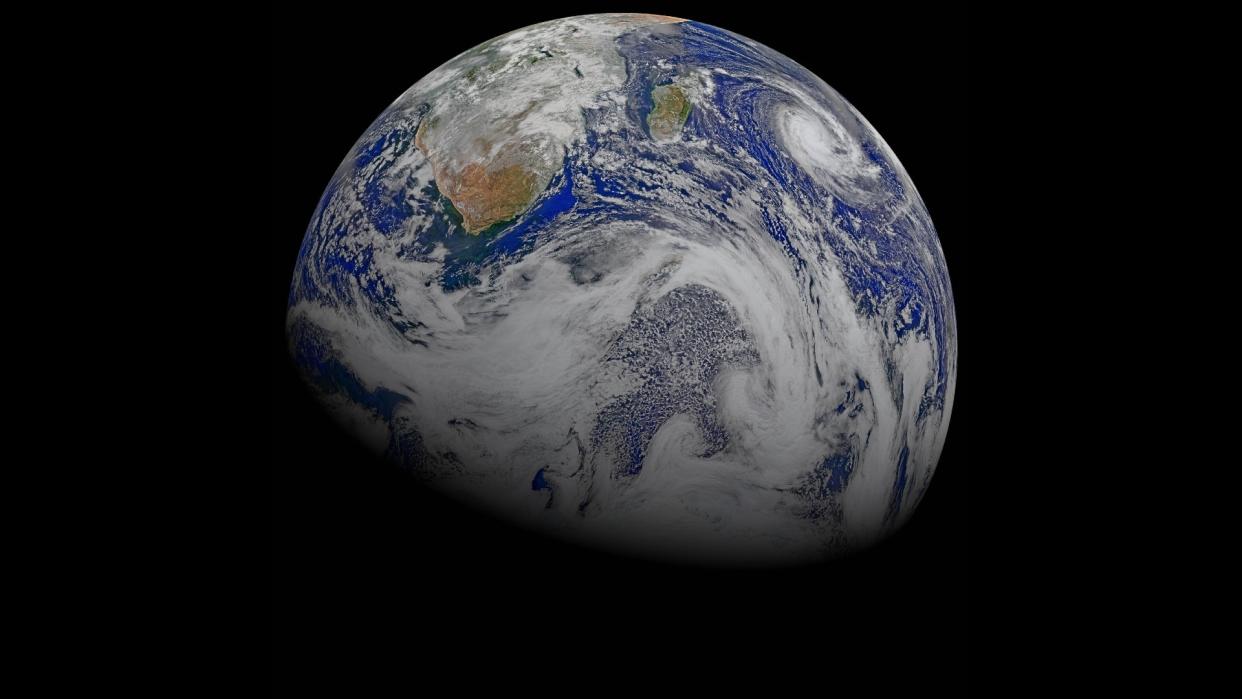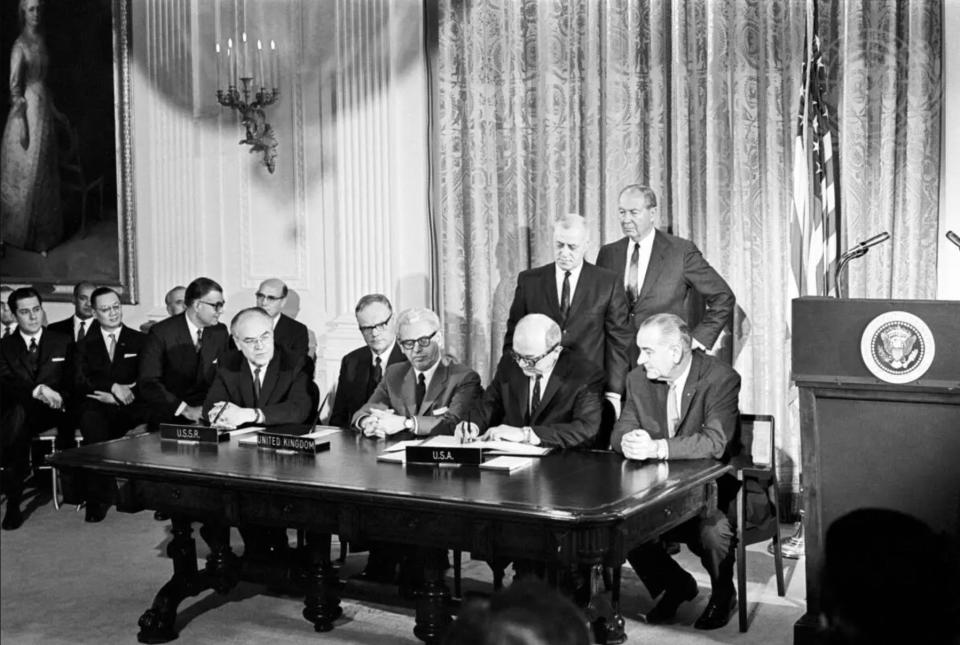Is it time for a new Outer Space Treaty? Reports of Russian nuclear space weapon raise questions

In February 2024, reports of a planned Russian nuclear space weapon renewed Cold War-era fears of the militarization of Earth's orbit.
The furor began when U.S. House Intelligence Committee chair Mike Turner (R-Ohio) issued a public statement asking President Biden to declassify all information relating to a space-based nuclear weapon that Russia is reportedly developing. The next day, White House National Security Communications Advisor John F. Kirby assured the public that "though Russia's pursuit of this particular capability is troubling, there is no immediate threat to anyone's safety."
"We are not talking about a weapon that can be used to attack human beings or cause physical destruction here on Earth," Kirby added. It remains unclear if the potential Russian capability concerns a nuclear warhead in space or a nuclear-powered anti-satellite weapon of some kind.
Nevertheless, the reported Russian nuclear space weapon ignited discussions about the Outer Space Treaty (OST), an international agreement that set the norms for behavior in space. The Outer Space Treaty was created in response to the development of intercontinental ballistic missiles, which travel through space on their way toward their targets.
But since then, space-faring superpowers have developed many other spacecraft and weapon capabilities designed to attack satellites from Earth, threaten other spacecraft from orbit, or even launch attacks on ground-based targets from space. The United States, Soviet Union and United Kingdom were the first three nations to enter the treaty in 1967, and today 114 countries have signed it.
In light of these developments, many policymakers and experts are wondering: Is it time for a new Outer Space Treaty?
Related: Russia's nuclear anti-satellite weapon poses 'no immediate threat' to Earth, White House says
Sharon Squassoni is a George Washington University professor of international affairs whose research focuses on reducing risks from nuclear energy and nuclear weapons. When it comes to the possibility of a new treaty to ban their development or deployment, Squassoni told Space.com that Russia today suffers from credibility issues that could stall international cooperation.
"The real problem is that even small steps related to transparency or confidence-building are virtually impossible, because Putin will reject them as long as he is engaged in war against Ukraine," Squassoni said, referring to Russian President Vladimir Putin.
Squassoni added that Russia's reported development of a nuclear space weapon is ironic given the nation has historically been at the forefront of establishing arms control in outer space.
In 2008, Russia and China even submitted a joint draft of a new treaty to the United Nations that would build upon the Outer Space Treaty, obligating nations to "refrain from placing objects carrying any type of weapon into orbit, installing weapons on celestial bodies, and threatening to use force against objects in outer space."
But the new treaty did not gain widespread international support. "The U.S. and other states opposed it for substantive reasons," Squassoni said. "A modest agreement prohibiting placing any kind of weapons in orbit could be useful, but traditionally, the sticking point has been the need to include ground-based ASAT capabilities."

Florida State University Associate Professor of History Ron Doel studies the history of science and space, especially in the context of the Cold War. Doel told Space.com that it could be difficult to gain international support for a new treaty, given other recent arms control examples such as the Strategic Arms Limitation Talks (SALT II) in 1979.
"Ratifying the Outer Space 1967 treaty proved easier to do than, say, the subsequent SALT II treaty (which extended some provisions of the OST)," Doel said. "Is it better to keep current frameworks in place, even as key technological systems are evolving?"
Unfortunately, even if Russia violated the OST through the development of a nuclear-powered space weapon — or if any other nation violated it through similar means — there are very few options for the international community to pursue punishment of any kind. "There are no treaty-prescribed consequences of noncompliance, but states could choose to impose sanctions related to this," Squassoni said.
Even sanctions might not be a guarantee in the event the Outer Space Treaty is violated, however. "Remember that China, a permanent member of the U.N. Security Council, is likely to veto U.N. sanctions" Squassoni added.
"Another complication is whether we know what the capability is until Russia actually uses it. If we do have excellent intelligence, are we willing to share it to make the case for imposing costs on Russia? Not clear."
A more recent example occurred in 2021, when Russia conducted a destructive anti-satellite test in which a ballistic missile destroyed a defunct spy satellite, creating a massive cloud of debris in orbit that threatened other spacecraft, including the International Space Station.
The test drew widespread condemnation from the international community, and there was discussion of whether or not such a test violated the OST. Article IX of the treaty states that signing parties "shall conduct all their activities in outer space, including the moon and other celestial bodies, with due regard to the corresponding interests of all other States Parties to the Treaty."
Just months later, Russia issued a threat against Western-owned private satellites, calling them a "legitimate target." Such an attack would be a violation of the Outer Space Treaty, although Russia claimed that the use of civilian satellites to collect intelligence over battlefields such as in Ukraine is a violation in itself.
That's why Doel said that, ultimately, treaties are fragile and depend on the success of enforcement mechanisms. Furthermore, these agreements are often upended by rapid technological advances or geopolitical developments. "Treaties can be fragile but remain honored because no new political, economic or technological developments are sufficient to challenge them — so maintaining the status quo generally seems a good option," Doel said.
Doel cited the example of the Antarctic Treaty of 1959, which he said continues to be upheld due to the fact that there's been no unexpected discovery of major natural resources on the continent that could cause a "gold rush."
RELATED STORIES:
— US military eyes SpaceX Starship for 'sensitive and potentially dangerous missions': report
— Russian plans for space-based nuclear weapon to target satellites spark concern in US Congress
— Space is now 'most essential' domain for US military, Pentagon says
Such a discovery and subsequent gold rush might be currently playing out in outer space. Many different nations are racing to establish a sustainable presence on the moon in what some have called a "lunar gold rush" to secure access to water ice, helium-3 (an isotope eyed for use in nuclear fusion reactors) and rare earth minerals.
Even intangible resources such as strategic orbits or radio frequencies are being seized quickly by space superpowers in the name of national security and economic prosperity.
That's one reason why NASA administrator Bill Nelson has openly said that the U.S. is in a new "space race" as the agency aims to put humans back on the moon through its Artemis Program.
And just like in the last space race during the Cold War, the rapid development of new spaceflight capabilities has led to new questions about international cooperation in space and the militarization of Earth orbit. Whether a new Outer Space Treaty is a real possibility remains to be seen.
